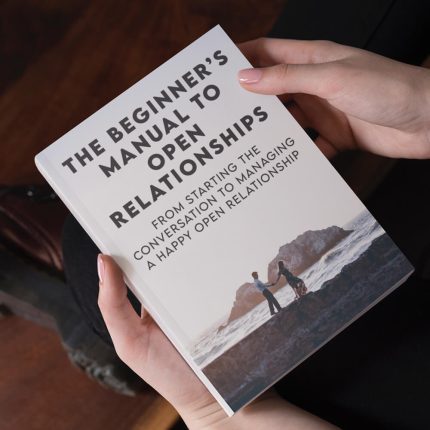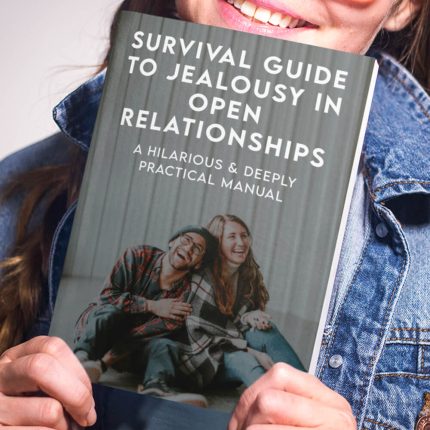Compersion

Ever find yourself grinning uncontrollably when your partner is having a great time with someone else? No, it’s not because you’re a secret supervillain with twisted fantasies—it might be something far more heartwarming. Welcome to the fascinating and uplifting world of compersion in ethical non monogamy. Imagine a joy so contagious that when one person in your relationship feels ecstasy, that happiness ripples through the whole network like a perfectly executed domino effect. Buckle up as we explore the ins and outs of compersion, its roots, its impact on relationships, and practical strategies to cultivate that infectious joy.
Have you ever wondered if monogamy is just a stupid little experiment? Open relationships, polyamory, relationship anarchy...find out which relationship dynamic suits you best with our one minute relationship test. See if you are just conforming to "societal norms". Reveal your truth >>
Quick Links to Useful Sections
- The Ethical Non Monogamy Term: Compersion
- What Is Compersion?
- Historical and Cultural Roots of Compersion
- Emotional Dynamics: How Compersion Changes the Game
- Benefits of Cultivating Compersion
- Challenges in Experiencing Compersion
- Practical Strategies for Cultivating Compersion
- Enhance Open Communication
- Work on Self-Awareness and Mindfulness
- Celebrate Each Other’s Successes
- Build a Supportive Relationship Network
- Set Realistic Expectations
- Frequently Asked Questions (FAQ)
- Resources and Community Support: Your Next Steps
The Ethical Non Monogamy Term: Compersion
What Is Compersion?
Compersion is often described as the opposite of jealousy. It’s that warm, fuzzy feeling you get when you see your partner happy and fulfilled—especially when they’re enjoying a positive experience with someone else. Rather than feeling threatened or insecure, you feel genuine joy for your partner’s pleasure. In ethical non monogamy, compersion is celebrated as a cornerstone of healthy, supportive relationships.
Unlike jealousy, which can lead to tension and conflict, compersion creates a shared sense of happiness. It’s like a group high-five for love, where everyone’s joy lifts each other up, making the entire relationship network feel more resilient and connected.
Historical and Cultural Roots of Compersion
Although the term “compersion” might sound like it was invented in a modern self-help workshop, its underlying concept has existed for ages. Various cultures have long recognized that love and happiness can be abundant—and that one person’s joy doesn’t diminish your own. Early non-monogamous communities and free love movements hinted at these ideas, even if they didn’t have a catchy term for it. Today, compersion is embraced especially in polyamorous circles as a way to reframe non-monogamy from a perspective of scarcity to one of abundance.
EXPLORE OUR ETHICAL NON-MONOGAMY & OPEN RELATIONSHIP SHOP
👨💻👩💻 Digital Store (Instant Download)
🍆💦 Clothing Store (Worldwide Delivery Available)
Sharing Is Caring Unisex T-Shirt (Black)
$29.99Sharing Is Caring Daddy Cap (Black)
$39.99Three Isn't a Crowd Unisex T-Shirt (White)
$29.99Fuck Each Other Not The Planet Unisex T-Shirt (Black)
$29.99I Love Watching Pop Art T-Shirt (Black)
$29.99It's Not Cheating If He Watches T-Shirt (Black)
$29.99Three Isn't a Crowd Unisex T-Shirt (Black)
$29.99I Love Watching Pop Art T-Shirt (White)
$29.99Real Men Share Pop Art T-Shirt (Black)
$29.99Real Men Share Pop Art T-Shirt (White)
$29.99Multiple Lovers - Sharing Is Caring Unisex T-Shirt (Black)
$29.99Fuck Each Other Not The Planet Unisex T-Shirt (White)
$29.99With the advent of online communities and digital forums, compersion has become a buzzword that encapsulates the optimistic side of ethical non monogamy. It’s a cultural shift away from the “I want you all to myself” mindset towards a celebration of shared happiness.
Emotional Dynamics: How Compersion Changes the Game
In a relationship, emotions often run high, and feelings like jealousy can easily surface. Compersion flips that script. Instead of competing for limited love, partners revel in the joy that comes from knowing their loved ones are happy. This doesn’t mean compersion magically erases all negative feelings, but it offers a powerful counterbalance.
Imagine watching a sunrise that fills you with awe and gratitude, rather than envy for the sun’s glow. When you experience compersion, your partner’s happiness acts like a positive energy booster that enhances your own emotional well-being. It encourages an environment where everyone’s triumphs are celebrated, creating a supportive, synergistic network.
Benefits of Cultivating Compersion
Embracing compersion can transform the emotional landscape of your relationship in several meaningful ways:
- Enhanced Trust: When you actively work to feel joy for your partner’s happiness, you reinforce a foundation of trust and security.
- Reduced Jealousy: Focusing on shared joy helps diminish the negative impact of jealousy, allowing for a more harmonious relationship.
- Increased Emotional Resilience: A network of compersion fosters a positive emotional environment, making it easier for everyone to navigate challenges together.
- Deepened Connection: Sharing in each other’s happiness creates stronger bonds and a more fulfilling relationship experience.
- Collective Growth: When compersion spreads through a relationship network, it encourages all partners to grow and evolve together.
Challenges in Experiencing Compersion
Despite its many benefits, compersion isn’t always easy to achieve. Some common challenges include:
- Residual Jealousy: It’s natural to experience jealousy, and overcoming it to fully embrace compersion can take time and effort.
- Emotional Insecurity: Deep-seated insecurities may hinder your ability to feel genuine joy for your partner’s experiences.
- Cultural Conditioning: Society often teaches us that love is scarce, making it hard to break free from the mindset of “there’s not enough love to go around.”
- Communication Gaps: Without open and honest dialogue, misunderstandings can impede the flow of compersion.
Practical Strategies for Cultivating Compersion
Enhance Open Communication
Start by fostering an environment of transparency. Regular check-ins and honest discussions about your feelings can help create the space for compersion to grow.
- Schedule Group or One-on-One Check-Ins: Whether it’s a weekly meeting or spontaneous chats, consistent communication is key.
- Practice Active Listening: Listen without interrupting and reflect on what you hear, ensuring that all partners feel heard.
- Express Gratitude: Make it a habit to express thanks when your partner shares a positive experience, reinforcing the cycle of shared joy.
Work on Self-Awareness and Mindfulness
Understanding your own emotional landscape is critical. Practice mindfulness to become more aware of your feelings and to learn how to channel them positively.
- Meditation: Regular mindfulness or meditation can help you process emotions and appreciate the happiness of others.
- Journaling: Keep a journal to track your feelings of compersion, jealousy, and gratitude. Reflecting on your progress can be incredibly empowering.
Celebrate Each Other’s Successes
Make it a point to celebrate your partner’s achievements, big or small. Shared celebrations can turn individual joy into a collective win.
- Plan Group Celebrations: Organize outings or parties to mark special moments, reinforcing the connection between all partners.
- Personal Acknowledgment: A simple compliment or heartfelt note acknowledging your partner’s happiness can go a long way in fostering compersion.
Build a Supportive Relationship Network
Surround yourself with like-minded individuals who value open communication and mutual support. A robust relationship network can amplify the positive effects of compersion.
- Join Online Communities: Platforms like r/polyamory provide a space to share experiences and learn from others.
- Attend Workshops: Look for local events focused on ethical non monogamy and relationship psychology to gain new insights and tools.
Set Realistic Expectations
Remember that cultivating compersion is a process, not an overnight transformation. Allow yourself time to grow, and don’t be discouraged by setbacks.
- Be Patient: Understand that it may take time to overcome ingrained feelings of jealousy and insecurity.
- Celebrate Small Wins: Recognize and appreciate every moment of shared joy as you work towards a more connected relationship network.
Frequently Asked Questions (FAQ)
1. What is compersion?
Compersion is the feeling of joy and happiness that comes from seeing your partner experience pleasure or fulfillment, particularly with someone else. It’s often described as the opposite of jealousy.
2. How does cascading compersion differ from regular compersion?
While regular compersion is the individual feeling of joy for your partner’s happiness, cascading compersion refers to how that positive emotion spreads throughout the entire relationship network, uplifting everyone involved.
3. Why is compersion important in ethical non monogamy?
Compersion promotes a culture of shared joy and trust, helping to counteract jealousy and create a supportive, interconnected relationship network.
4. How can I cultivate compersion if I struggle with jealousy?
Start by practicing mindfulness and self-reflection, engage in open communication with your partner(s), and consider seeking guidance from a therapist who specializes in non-monogamous relationships.
5. What role does communication play in fostering compersion?
Open and honest communication is crucial—it allows you to share positive experiences, express gratitude, and address any underlying insecurities that may hinder your ability to feel compersion.
6. Can compersion improve my overall relationship satisfaction?
Absolutely. When you experience compersion, it not only boosts your mood but also strengthens the emotional bonds within your relationship network, leading to greater overall satisfaction.
7. Is compersion exclusive to polyamorous relationships?
While compersion is most commonly discussed in polyamorous contexts, its principles can apply to any relationship where partners derive joy from each other’s happiness.
8. What are some practical activities to enhance compersion?
Activities such as group celebrations, regular check-ins, and collaborative projects can foster an environment where compersion flourishes.
9. How does mindfulness contribute to compersion?
Mindfulness helps you become more aware of your emotions and appreciate the positive experiences of your partner(s), making it easier to cultivate genuine compersion.
10. Can professional help aid in developing compersion?
Yes, therapists or counselors experienced in ethical non monogamy can provide tools and strategies to help you overcome jealousy and build a more compassionate, connected relationship network.
11. How do shared celebrations reinforce cascading compersion?
When you celebrate your partner’s successes and happiness as a group, it creates a collective sense of joy that strengthens emotional bonds and encourages positive energy throughout the network.
12. Where can I find additional resources on compersion?
Additional resources include books like The Ethical Slut by Dossie Easton & Janet Hardy, podcasts such as Multiamory, and online communities like r/polyamory where you can learn from others’ experiences.
Resources and Community Support: Your Next Steps
- The Ethical Slut by Dossie Easton & Janet Hardy – This groundbreaking book explores the philosophy behind ethical non monogamy, including detailed discussions on compersion.
- Podcasts: Listen to Multiamory and similar shows for personal stories and expert advice on cultivating compersion and managing non-monogamous relationships.
- Online Communities: Engage with groups such as r/polyamory to share experiences, ask questions, and gain insights into the practice of compersion.
- Workshops and Webinars: Attend events focused on ethical non monogamy and relationship psychology to deepen your understanding and connect with like-minded individuals.
- Therapy and Counseling: Consider seeking professional support if you need help managing jealousy or want to cultivate a more joyful, connected approach to your relationships.
By exploring these resources and applying the practical strategies outlined above, you can develop a rich, informed understanding of cascading compersion and learn how to infuse your relationship network with contagious joy. Embrace open dialogue, continuous learning, and self-reflection as you transform your emotional landscape into one where happiness is shared and multiplied across every connection.
EXPLORE OUR ETHICAL NON-MONOGAMY & OPEN RELATIONSHIP SHOP
👨💻👩💻 Digital Store (Instant Download)
🍆💦 Clothing Store (Worldwide Delivery Available)
I Love Watching Pop Art T-Shirt (Black)
$29.99Sharing Is Caring Unisex T-Shirt (Black)
$29.99Fuck Each Other Not The Planet Unisex T-Shirt (White)
$29.99It's Not Cheating If He Watches T-Shirt (Black)
$29.99Real Men Share Pop Art T-Shirt (White)
$29.99I Love Watching Pop Art T-Shirt (White)
$29.99Three Isn't a Crowd Unisex T-Shirt (White)
$29.99Real Men Share Pop Art T-Shirt (Black)
$29.99Multiple Lovers - Sharing Is Caring Unisex T-Shirt (Black)
$29.99Three Isn't a Crowd Unisex T-Shirt (Black)
$29.99Sharing Is Caring Daddy Cap (Black)
$39.99Fuck Each Other Not The Planet Unisex T-Shirt (Black)
$29.99Lost & confused by all of the terms, types and seemingly made up 3 letter acronyms?? We've got you. Check out our Ethnical Non-Monogamy Dictionary >>
Useful Interruption: Not sure which relationship vibe fits you best? Take our Relationship Test, it’ll give you the real insight into your natural relationship style. Then, dive into our binge-worthy guides (from the tried-and-true to the “wait, that’s a thing?”) and find the perfect relationship type for your life:
- Monogamy
- Open Relationships
- Ethical Non-Monogamy
- Solo Polyamory
- Non-Hierarchical Polyamory
- Hierarchical Polyamory
- Relationship Anarchy
- Swinging
Now back to the main article but yeah take the test...

































